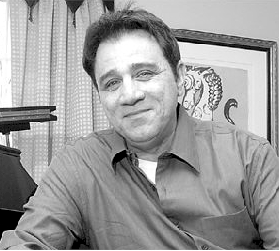 You might not know Franke Previte by name, but you know his music, because you know Bill Medley and Jennifer Warnes’ “(I’ve Had) The Time of My Life” and Eric Carmen’s “Hungry Eyes,” both from the ultimate chick flick, the 1987 classic Dirty Dancing, as well as the 2,398.2 television commercials that have used one or the other song. Who can forget that final scene, when Johnny Castle (the late, great Patrick Swayze) shares a final, sensual dance with “Baby” Houseman (Jennifer Grey), in front of her parents, her buxom sister (the woefully under-used Jane Brucker), and a roomful of well-heeled Catskills vacationers? Who would have thought that the scene was almost shot to a Lionel Richie song?
You might not know Franke Previte by name, but you know his music, because you know Bill Medley and Jennifer Warnes’ “(I’ve Had) The Time of My Life” and Eric Carmen’s “Hungry Eyes,” both from the ultimate chick flick, the 1987 classic Dirty Dancing, as well as the 2,398.2 television commercials that have used one or the other song. Who can forget that final scene, when Johnny Castle (the late, great Patrick Swayze) shares a final, sensual dance with “Baby” Houseman (Jennifer Grey), in front of her parents, her buxom sister (the woefully under-used Jane Brucker), and a roomful of well-heeled Catskills vacationers? Who would have thought that the scene was almost shot to a Lionel Richie song?
Previte won an Academy Award for “Time of My Life,” and the revenues from the song have likely kept him out of housing projects for the last 25 years or so. Before Dirty Dancing came calling, though, Previte had already achieved a modicum of fame, however fleeting, for the bloozy hard rock of his early Seventies band Bull Angus, and, more so, for the radio-friendly AOR hits (“Sweetheart,” “You’re My Girl,” and “Without You [Not Another Lonely Night]”) of his early Eighties band Franke & the Knockouts.
Previte is back, with both product and a purpose. Friday Music has just reissued downloadable copies of all three Knockouts records, as well as Sweetheart—Anniversary Edition, a 19-track best-of that compiles hits and key album tracks from Franke & the Knockouts’ brief but high-quality run. (Seriously, if you like Toto IV, Quarterflash, Foreigner’s Agent Provocateur, and the like, you need to check this out). Previte has also called on an old friend with a high profile—former Knockouts drummer Tico Torres, who left Previte’s employ for a little band called Bon Jovi—to help get the word out.
More importantly, all monies Previte makes from the reissues will go to fund research into beating pancreatic cancer, which killed his friend Swayze and which Swayze’s widow, Lisa, is still involved in fighting.
I spoke with Franke Previte in June; he was at his home in New Brunswick, NJ.
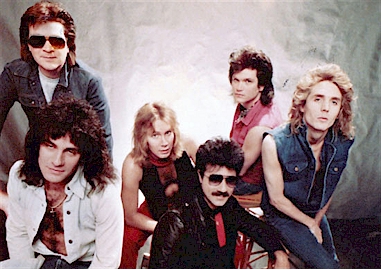 I remember not that many years ago, looking for Franke and the Knockouts music on CD, and the only thing I could find was a best-of on eBay going for $200.
I remember not that many years ago, looking for Franke and the Knockouts music on CD, and the only thing I could find was a best-of on eBay going for $200.
I know. That’s ridiculous.
What brought up this whole reissue campaign? The stuff’s been out of print for so long.
What really brought it up was the whole Patrick Swayze thing. I was the writer of “(I’ve Had) The Time of My Life” and “Hungry Eyes,” and those songs were, like, very close to Patrick Swayze when I met him at the Academy Awards [in 1988]. The story he told me was how they didn’t have the final song for the last scene, and they were getting ready to film to a Lionel Richie track. They were like, it’s a good song, but it’s not an original song and it’s not our song. They had listened to 149 songs up to that point. He said, “We got to the last tape and the 150th song we listened to was ‘(I’ve Had) The Time of My Life.’ And we started screaming and we were thrilled with your demo.” They filmed out of sequence, so they were doing the last scene first. He said, “By the time that take was over, we just looked at each other and said, ‘Oh man, what just happened?’ We knew we had a great movie, and the song just inspired us to do the rest of Dirty Dancing.”
I’d spent some other time with Patrick at some other charity events, and I knew how special a person he was—there was a little Johnny Castle in Patrick Swayze, and vice versa. I decided to find out what Lisa Swayze was doing, and discovered she was working with a couple of organizations to raise money for and awareness of pancreatic cancer. So I allied myself with both of those charities—one was the University of Stanford, where he was treated and where they do research; and the other one is the Pancreatic Cancer Action Network, out of California, where they try to do early prevention.
I put out the demos that they filmed the movie to—”(I’ve Had) The Time of My Life,” “Hungry Eyes,” and a third song, called “Someone Like You,” which is in the Dirty Dancing stage play. I started raising money that way. We’ve raised about $5,000 or $6,000 selling those demos and t-shirts. And I said, “I’ve got to have a next phase to this, so I can continue to raise money,” and I looked online and saw what you saw—somebody selling the best-of for $150! I thought, “Somebody’s got to be doing pretty good to buy that.” [Laughs] And I thought that maybe I could find someplace that still remembered Franke & the Knockouts, and see if I could put a record out.
I found out about Friday Music and [Friday Music President/CEO] Joe Reagoso, who it turned out was an old RCA guy who originally did radio promotion for Franke & the Knockouts. Turned out, he was a big fan. And he said, “Man, I would love to do something.” Friday Music puts out stuff by, like, the Doobie Brothers and all these bands that were out around the same time the Knockouts were out. And he said, “We can put out the songs on a best-of, but I know there are people who still want to buy each record individually.”
So we did the best-of and put the three Knockouts records out individually, as well, for those people who might just want to buy the first record or the third record. And we put a couple bonus tracks on the compilation. We put “Hungry Eyes” on there; that was always a Knockouts song—it was on my demo reel that I sent around trying to get a record deal when Jimmy Ienner, the president of Millennium [Records, the Knockouts’ former label], closed his label. Nobody thought that song was all that great. I always considered it a Knockouts song, so we put it on there.
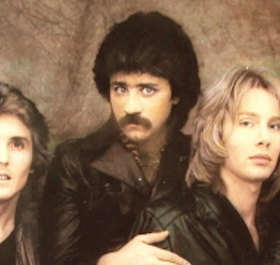 There was another song that I wrote that Jimmy Ienner had on hold for ten years, in case there would ever be a sequel to Dirty Dancing. So when the sequel eventually came out, Jimmy sent the song over to Clive Davis, and Clive was like, “Nah, not a hit.” And I said, I still think it could be a hit record. So my little idea is, is Clive right or wrong? Is it a hit record? Let the fans choose. It’s called “Beat of a Broken Heart.” Even thought it’s a demo done in a basement on a 12-track, I think it’s a terrific song. I think it’s a hit record, so I put it on the best-of.
There was another song that I wrote that Jimmy Ienner had on hold for ten years, in case there would ever be a sequel to Dirty Dancing. So when the sequel eventually came out, Jimmy sent the song over to Clive Davis, and Clive was like, “Nah, not a hit.” And I said, I still think it could be a hit record. So my little idea is, is Clive right or wrong? Is it a hit record? Let the fans choose. It’s called “Beat of a Broken Heart.” Even thought it’s a demo done in a basement on a 12-track, I think it’s a terrific song. I think it’s a hit record, so I put it on the best-of.
I’m taking all of my proceeds that I make from these reissues and donating them to the Pancreatic Cancer Action Network.
That’s fantastic.
That’s the reason I’m doing all of it.
That’s terrific. Is it true you almost turned down the opportunity to be involved with Dirty Dancing?
I did. I got a call from Jimmy Ienner, out of the blue, and he said, “I got this movie, called Dirty Dancing, and I’d like you to write a song for it.” And I told him I didn’t have the time; I was trying to get a record deal. But he was persistent. He said, “Franke, this is going to change your life.” And I said, “Yeah, right. You already did that.” And at my speech at the Academy Awards, I thanked Jimmy for changing my life.
What do you think of the covers, or quasi-covers, of “(I’ve Had) The Time of My Life?” Everybody from Barry Manilow to the Black Eyed Peas has wanted to interpret it in some way.
You know what? Obviously, I’m a little prejudiced toward the original version. But I did hear Barry Manilow’s version, because Michael Lloyd is a good friend and he produced that. He told me many months before it came out that Barry was going to do a cover of it.
I got a call from Will.I.Am’s people, and they sent me a version of [“The Time (Dirty Bit)”], and my head was, like, sideways for a while [laughs]. After I heard the story of why and what it meant to them, and what a “dirty bit” really is, because I was thinking, “dirty bit, Dirty Dancing,” and “time, ‘Time of My Life,'” but it had nothing to do with that. Basically, when a bit isn’t clean before it’s processed and put into a musical format, it’s called a “dirty bit.” And they were taking some of the genres of the Eighties, because the Eighties’ music is becoming very popular again, and they wanted to transform some of the Eighties sound into the present. So you take some of “Time of My Life,” which was a big song in the Eighties, and put it into what they do, and get their interpretation. I thought it was different. I thought it was interesting. I thought it was innovative in the sense of electronic music and what they can do. But I still love the original.
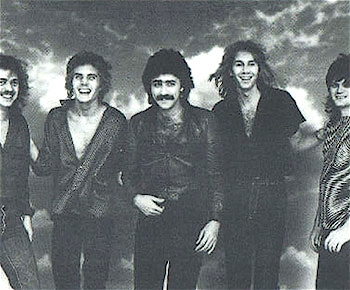 Yeah, absolutely. Now you had three Top Twenty hits with the Knockouts, but of course, “Sweetheart” is the band’s best-known song. What do you recall about writing and recording that song?
Yeah, absolutely. Now you had three Top Twenty hits with the Knockouts, but of course, “Sweetheart” is the band’s best-known song. What do you recall about writing and recording that song?
What I remember most is that it was the last song I wrote after we got our deal. I went in with a really rough demo of it, and I sang it for Jimmy Ienner, and he said, “No way. No way you’re putting that on the record. It’s too cute. It’s too sweet. You’re going to get branded as a pop act. All these other rock and roll songs that I’m signing you for—‘She’s a Runner’ and all the other stuff on the record—I’m afraid they won’t get heard.” I said, “Okay.” Then RCA heard it and went, “That’s the single. That’s the song.” So we went ahead and recorded it. Jimmy was kind of right, though. We got pigeonholed as a pop band, but without that song, you and I wouldn’t be talking.
There are so many terrific songs on that first record. “Sweetheart” was the one that hooked me, but I remember “You’re My Girl,” “She’s a Runner”—all those really cool songs.
“Annie Goes to Hollywood” is another one. I really liked that one.
Absolutely. Great stuff. Then the second record comes out, and you have another hit with “Without You.” Was there a conscious effort to follow up your first hit album with another hit album, or was it all a little more organic than that—you make your music and just let the chips fall?
The first record is always like your greatest hits, because you had your whole life to write it. Then you’re stuck on the road, and then it’s time to cut the second record. You don’t have the time to generate the 25 or 30 songs you need to put out the kind of record you did the first time around. We spent a lot of time trying to write on the bus, and we would jam on the road in sound checks, and when we got encores, we’d do the new stuff in the encores, to play them out a little bit. And “Never Had It Better” was always a song that we did in our sound check or as an encore.
I love that song.
I never really had lyrics for it. I’d make up words in the verses. Then everybody would say to me, “Between Toledo and wherever we’re going next, try to write some lyrics.” [Laughs]
Was that ever a single?
It should have been.
I could swear I heard that on the radio back then.
You know, what they probably did is release the single “Without You” and then they pushed “Never Had It Better” as an AOR track, like they did on the first record. “Sweetheart” was the single, and “Comeback” was the AOR track. They’d do that to get more rock radio play. People would come to see us and go, “Damn! You guys rock out!”
The press release that I got for the reissues talks about Tico Torres‘ presence in the band before he went on to Bon Jovi. He wasn’t on the first two records, and I’m curious what his tenure in the group was like—how long it was and what he contributed.
After the first record was cut, Jimmy Ienner said, “You know, I think you need a stronger drummer.” I said, “No, I think Claude [LeHenaff] is really good.” But he was insistent—”No, I think you guys should change drummers.” So after the second record, we went down to Criteria [Studios] in Miami, and a bunch of different drummers came down, and they brought the [studio] drummer from Detroit who played on the last record. He was a good drummer, but he didn’t have a rock and roll vibe that we wanted to portray. We went back home planning to try out some more drummers, and after five or six guys, Tico came in to audition. I had jammed with Tico and I had invited him there. He started playing the stuff, and I stopped him and said, “We just found our heartbeat.”
He was the drummer on the tour for the second record; he was the drummer who played on the third record; and he was my best man at my wedding.
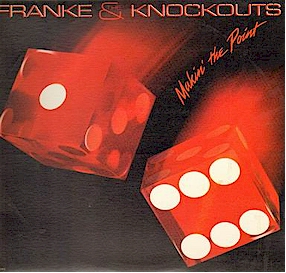 Oh, wow! I didn’t know that.
Oh, wow! I didn’t know that.
Yeah. In fact, I talked to him two weeks ago. He’s helping me promote these Knockouts releases for pancreatic cancer. He sent me an email last week from the road—[Bon Jovi] are in Europe for about three months—he said, “I’ll do whatever I can with Skype, and I’ll do Modern Drummer for you. Whatever I can do—talk about the record and what my favorite song was, whatever.” So Tico’s involved. Leigh Foxx, who’s playing in Blondie, was our bass player, and he’s also out promoting the record and trying to raise money.
That’s terrific. You mentioned the third record. To be honest, before I started looking for your stuff online, I wasn’t aware that you had a third record with the Knockouts.
Yeah—Making the Point.
It didn’t do that well. What do you think the reasons were for that?
Oh, I know the reason. After we recorded it, Jimmy decided to shut down his record company, to close up shop. It took a year for him to close up shop and sell the record to MCA. MCA got the record a year later, and that really stunted it. There was no more band; we were not out playing. Tico had called me when we were still finishing the record, and said, “I’m going to go jam with this kid [Jon] Bon Jovi; do you mind if I do some demos?” And I said, “Ah, yeah, sure.” [laughs]
What could possibly come of that?
Yeah, and Bon Jovi put out a song that sounded just like a song on my third record. Ours was “You Don’t Want Me” and his was “She Don’t Know Me.” They have the same melody. Tico went, “I’m sorry! I’m sorry!” [laughs] I said, “Whatever.” We really didn’t have a band anymore. MCA got the record and said, “We just lost Night Ranger, so we want you to be the new Night Ranger.” So they brought Night Ranger’s producer in and remixed the record. They did that and put out “Outrageous” as the first single instead of “Come Rain or Shine”—that was a song I wrote to be like a “Sweetheart.” And we had Jeff Porcaro play on it, because he played with Toto. Radio didn’t take to it, and we got dropped.
That’s a shame.
Yeah. There are some good songs on that record.
Definitely. Now, as I was doing research for this conversation, I came across a couple early Seventies records by a band called Bull Angus.
Oh man.
Care to talk about that?
I still have shrapnel wounds. [laughs]
Where exactly does one go on “Uncle Duggie’s Fun Bus Ride?”
Well, Duggie was our roadie. And Duggie was the guy that, um, got the band in the right frame of mind to rehearse. The right frame of mind.
Okay. I think I know what you’re talking about. [laughs]
He had a big bus that he drove, and that was Uncle Duggie’s Fun Bus.
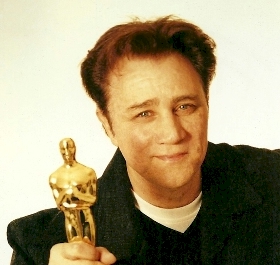 Those are really different kinds of records, really different music. They remind me a bit of Deep Purple and that type of thing.
Those are really different kinds of records, really different music. They remind me a bit of Deep Purple and that type of thing.
Well, that’s kind of funny, because when we first started with Mercury Records, we toured with Rod Stewart and the Small Faces and a band called Cactus. And our second tour was with Deep Purple.
Oh, okay. There you go.
Yeah, we went out with Fleetwood Mac, and we played this Pocono Mountains festival in 1971, and there were 300,000 people there. We flew in, in helicopters, because the traffic was backed up for 20 miles. It was a trip. That’s the kind of stuff that hooks you into it all, into the music, into the feeling that something’s going on. When you can’t see the end of the hands clapping, it’s a scary moment.
It was so different from what you’ve gone on to be known for. It makes me wonder what music you grew up with. What types of things were you listening to?
You’d never guess in a million years. My dad was an opera singer, from Italy. And I was constantly fighting those Italian notes, you know? I used to listen to a lot of the Rascals. I used to listen to a lot of R & B, with Sam and Dave and Otis Redding and the Temptations and the Four Tops. So I always tried to find the blue notes to get away from so many of those Italian notes.
What are you doing now? Do you perform or produce or write?
It’s funny—now that the record came out, my friend Mark Riviera—who was the sax player for Billy Joel and also the director for Ringo Starr’s All-Starr Band—called me up and said, “Man if you get your band back together, I want in.” John Regan, who we used to call “the skinny one” in Bull Angus, called me—he’s been playing with Peter Frampton and Ace Frehley. He said, “If you need a bass player, I’m there.” All these guys are coming out of the woodwork, saying, “You got this record out now; let’s go do a ‘Time of My Life’ tour.”
Last question for you. We at Popdose have a thing about mustaches; I’m pretty sure it comes from having a bunch of John Oates fans on the staff. And you had a great one, back in the day.
[laughs]Any chance you still got it?
I do. I still have it, but I don’t have it on me. I keep it in a drawer. [laughs]




Comments